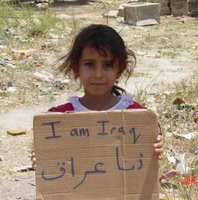Killing Iraqi Children
 By Jacob G. Hornberger
By Jacob G. HornbergerIn a short editorial, the Detroit News asked an interesting question:
“Some war critics are suggesting Iraq terrorist Abu Musab al-Zarqawi should have been arrested and prosecuted rather than bombed into oblivion. Why expose American troops to the danger of an arrest, when bombs work so well?”
Here’s one possible answer: In order not to send a five-year-old Iraqi girl into oblivion with the same 500-pound bombs that sent al-Zarqawi into oblivion.
Of course, I don’t know whether the Detroit News editorial board, if pressed, would say that the death of that little Iraqi girl was “worth it.” Maybe the board wasn’t even aware that that little girl had been killed by the bombs that killed Zarqawi when it published its editorial. But I do know one thing: killing Iraqi children and other such “collateral damage” has long been acceptable and even “worth it” to U.S. officials as part of their long-time foreign policy toward Iraq.
This U.S. government mindset was expressed perfectly by former U.S. official Madeleine Albright when she stated that the deaths of half a million Iraqi children from the U.S. and UN sanctions against Iraq had, in fact, been “worth it.” By “it” she was referring to the U.S. attempt to oust Saddam Hussein from power through the use of the sanctions. Even though that attempt did not succeed, U.S. officials still felt that the deaths of the Iraqi children had been worth trying to get rid of Saddam.
It’s no different with respect to President Bush’s war on Iraq and the resulting occupation, which has killed or maimed tens of thousands of Iraqi people, including countless children. (The Pentagon has long had a policy of not keeping count of the number of Iraqi people, including children, it kills.) In the minds of U.S. officials, the deaths and maiming of all those Iraqi people, including the children, while perhaps unfortunate “collateral damage,” have, in fact, been worth it.
That’s why U.S. officials gave nary a thought to the death of that five-year-old girl who was bombed into oblivion with the bomb that did the same to Zarqawi. The child’s death was “worth it” because the bomb also killed a terrorist, which U.S. officials believe, brings the Middle East another step closer to peace and freedom.
Wars of aggression versus defensive wars
Some would argue that such “collateral damage” is just an unfortunate byproduct of war. War is brutal. People get killed in war. Compared with the two world wars, not that many people have been killed in Iraq, proponents of the Iraq war and occupation would claim.
Such claims, however, miss an important point: U.S. military forces have no right, legal or moral, even to be in Iraq killing anyone. Why? Because neither the Iraqi people nor their government ever attacked the United States. The Iraqi people had nothing to do with the 9/11 attacks in New York and Washington. Thus, this was an optional war against Iraq, one that President Bush and his military forces did not have to wage.
Continue reading Here


0 Comments:
Post a Comment
<< Home